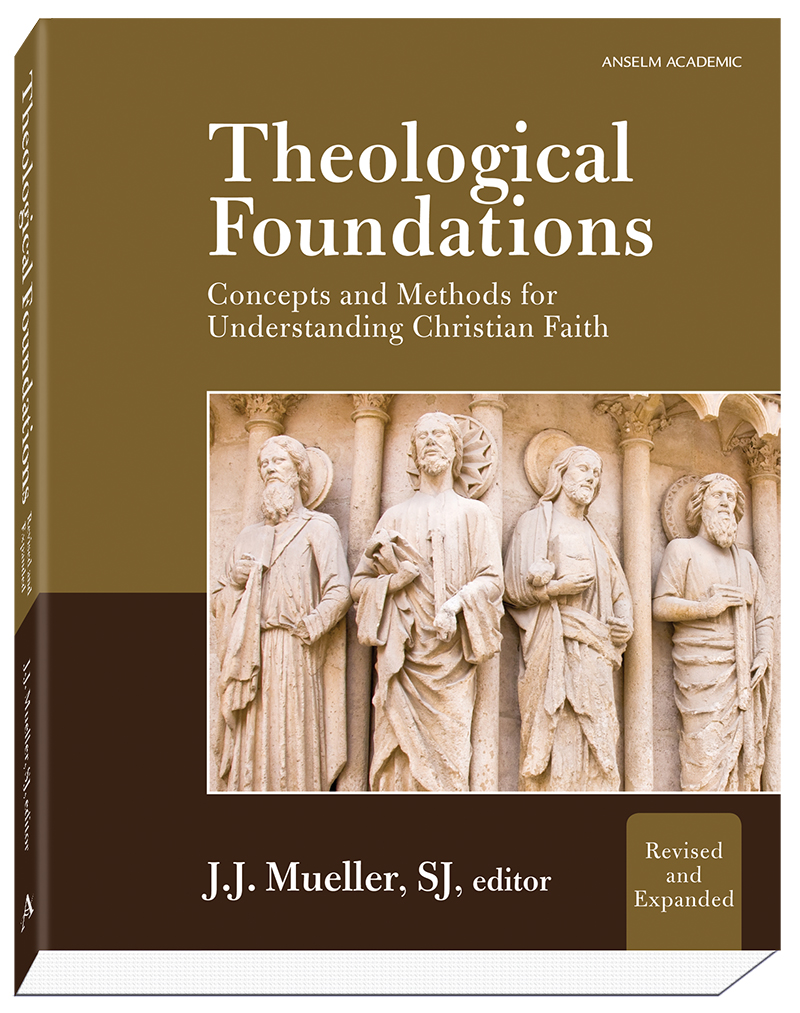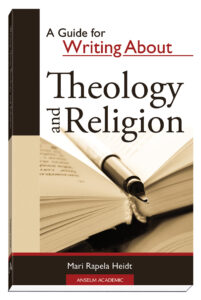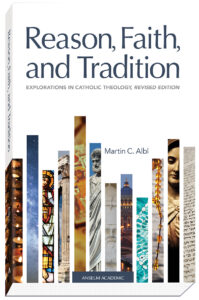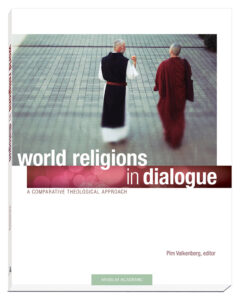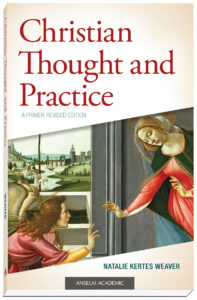Theological Foundations, Revised and Expanded
Concepts and Methods for Understanding Christian Faith
About This Book
Overview
Introduces students to the basics of Christian theology, covering its development through the ages and across cultures
Theological Foundations: Concepts and Methods for Understanding Christian Faith, rev. ed., is a thorough, concise, and comprehensive introductory theology text that has been revised with customer requests in mind. This prominent book on theology begins with a new introduction that centers the text on the Mystery of God. Its twelve body chapters unfold Christian theology by exploring its roots in the sacred scriptures; discussing the New Testament and other early Christian literature; and interweaving Christology and ecclesiology with the signs, symbols, and seven sacraments of the Church. Social justice issues figure prominently in the text, as does Catholicism’s relationship with Judaism and Islam. Subdisciplines of Catholic theology also address the Church’s mission in the world, as well as moral issues. Ultimately, the text describes the changing contours of Christianity in the modern era, with an emphasis on Protestantism, Evangelicalism, and Fundamentalism.
An important advantage to this text is its instruction for students in conducting valid theological research. To help students understand terms, concepts, and vocabulary, as well as the development of the tradition through the ages and across cultures, the book incorporates a significant library research component that introduces students to basic research skills.
Details
| Weight | 1.35 lbs |
|---|---|
| Dimensions | 7.25 × 1.5 × 9.125 in |
| Format | Softcover |
| Print ISBN | 978-1-59982-101-6 |
| Pages | 366 |
| Item # | 7035 |
|---|
Customer Reviews
“This text fills a real need for a challenging introductory text in Catholic theology. It is beautifully conceived, well written, inviting, and full of splendid resources rarely, if ever, found in comparable texts. I have used it with success and recommend it highly.”
Saint Mary's College of California, Morraga, CA
“Theological Foundations proved to be precisely the text I needed for my course, REL 334: Understanding the Christian Faith. My class is primarily dialogue and Theological Foundations provided the background necessary for the students to become involved in research and discussion. A big plus was the section ‘From the Reference Librarian.’ I asked the students to pick a topic from the assignment for the week, to follow the reference librarian’s prompts, and to write a one-page essay based on their research, with a second page explaining how they used the research skills and the sources they found. Without that section, the students would have used Google or, with my insistence, JSTOR, but perhaps would not have entered the physical library or turned in a printed page. To help with this, I scheduled two sessions in the library with our reference librarian. The students profited from this training in research and our discussions were lively and well-informed. Thanks to the editors and contributors and especially the reference librarian for an outstanding teaching resource.”
Endowed Chair in Catholic Thought
Fontbonne University, St. Louis, MO
“Theological Foundations is a welcome addition to the textbook market as it takes seriously the importance of critical theology within the Catholic purview and the application of this theology for traditional and nontraditional undergraduates. The author invites the learner to consider a variety of systematic perspectives, including a brief survey of a few interfaith and ecumenical traditions, yet he consistently remains faithful to the Catholic tradition. This is a remarkably accessible and appropriately challenging introductory theology text, particularly for students who are new to this discipline.”
Calumet College of St. Joseph
“This text is an excellent introduction to undergraduate theology. The scholars chosen for each section understand that most undergrads have never studied theology and are entering a new realm of knowledge. The material is thorough but written in language that the novice can readily understand. The reference librarian sections of each chapter are invaluable. If you need one text for an introductory course, this is the one.”
University of Great Falls
“Theological Foundations deals with the BIG questions: ’Why am I here?’ and ‘What is worth living for?’—inviting college students to the approachability and necessity of theology and its relevance to real life. The perfect book for introducing the building blocks of theology!”
“There are two things that I particularly like about this book, and that raise it above the average intro to theology book. First, the book invites students to use the library and find the sources for further research. I think that this is especially needed in a time in which students are not willing to rise from their seats and computer screens, thinking that everything can be found through the internet. Second, it broadens the horizon of the students by including chapters on Judaism, Islam, and Catholic theology in a global context.”
Table of Contents
Preface: From the Editor
Purpose of This Book
Audience
Organization of the Book and Revisions
Arrangement of Each Chapter
From the Reference Librarian: A Practical Guide to Doing Research
Starting with the Reference Collection—Skill Key #1
Review #1
Limited Resources
Review #2
Complete Review
The Internet
The Process of Research
Introduction: Religion, Spirituality, and the Question of God
What Is Religion?
What Is Spirituality For?
Tradition
How Big Is (My) Religion?
A Trip to Tuscany
This Book Has a Worldview
From the Editor
Wonderment and Perplexity Ways to God, Ways to Theology
What’s in a Name? The Transcendence and Nearness of YHWH
Creation and the One God: From Narrative to Confession
Living the Triune Mystery: The God of Christian Faith
Participation in Divine Life: Scriptural Witness and Creedal Formulation
Conclusion: Trinitarian Theology Today
PART I: THE SACRED SCRIPTURES AND CHRISTIAN THEOLOGY
2. The Old Testament
From the Editor
The Hebrew Bible, Called by Christians the “Old Testament”
Tanak Division 1—Torah: Words of Instruction
Tanak Division 2—Nebiim: Words of Judgment and Salvation
Tanak Division 3—Kethubim: Words of Wisdom
From the Reference Librarian: Researching Bible Topics—Old Testament
3. The New Testament and Other Early Christian Literature
Overview: The Early Christians and Their Writings
Early Christian Gospels
Keep in Touch: Early Christian Letters
Summary
PART II: CHRISTOLOGY AND ECCLESIOLOGY: FOLLOWING CHRIST IN A COMMUNITY OF THE HOLY SPIRIT
4. Christology—”Who Do You Say That I Am?”
From the Editor
The Question
The Story Begins: Jesus of Nazareth and the Kingdom of God
The Story Continues: The Christology of the New Testament Church
Faithfully Interpreting the Story: The Christological Councils
Conclusion: The Never-ending Question
From the Reference Librarian: Researching Theological Topics—Christology
5. The People of God: The Church
From the Editor
An Image
After That First Day
A Historical Resource
Is Competition Good for the Church?
Studying Tradition
Conclusion: Leaving a Lot Out
From the Reference Librarian: Researching Using the Internet—Ecclesiology
6. Protestantism, Evangelicalism, Pentecostalism: Changing Contours of Christianity in the Modern Era
From the Editor
Introduction
Protestantism
Evangelicalism
Pentecostalism
From Unity to Diversity, and Back Again: A Final Hypothesis
From the Reference Librarian: Getting the Most out of Encyclopedia
7. Grace and Sacraments: The Mystery of the Divine-Human Encounter
From the Editor
Overview
Signs and Symbols: Creating Meaning in Human Communication
Describing and Defining the Sacraments
The Two Basic Sacraments of Christ and Church
The Seven Sacraments
Conclusion: Christians as Living Sacraments
From the Reference Librarian: Combining Subject Headings—Sacraments
PART III: THE CHURCH’S MISSION IN THE WORLD
8. Christian Morality: Choosing God in This World
From the Editor
Decisions, Decisions, Decisions
What Resources Are Available?
Recognizing Moral Issues
From the Reference Librarian: The Synoptic Outline—Moral Issues
9. Social Justice: Gospel Witness and Mission of the Church
From the Editor
Overview
Gospel Witness
Conclusion: Social Justice and Christian Spirituality?
From the Reference Librarian: “Floating” Subdivisions and Social Justice Issues
PART IV: THE ABRAHAMIC FAITHS: CATHOLICISM AND RELATIONSHIPS WITH JUDAISM, ISLAM
10. Judaism, the Jewish People, and the Church
From the Editor
Overview
First-Century Judaism
Jewish Christianity
Rabbinical Judaism
Traditional Jewish Faith and Practice
Modern Judaism
Christian-Jewish Relations
The Holocaust and Vatican II on Jews and Judaism
From the Reference Librarian: The Encyclopedia Index in Research—Judaism
11. Islamic Religious Experience: Foundations, Scripture, and Spirituality
From the Editor
Overview
Islamic Images of God
The Qur’an and the History of Revelation
Muhammad and the History of Prophethood
Distinctive Scriptural Themes in Islamic Spirituality
From the Reference Librarian: Synoptic Outlines of Contents for all Topics—Islam
PART V: CATHOLIC THEOLOGY IN A GLOBAL CONTEXT
12. Catholic Theology in a Global Context: A World Church
From the Editor
Overview
Meaning of Terms: World Christianity, World Church
Theological Aspects of a World Church
Some Commonalities in Theologies from around the Globe
From the Reference Librarian: Geographical Descriptors—World Christianity
Index
